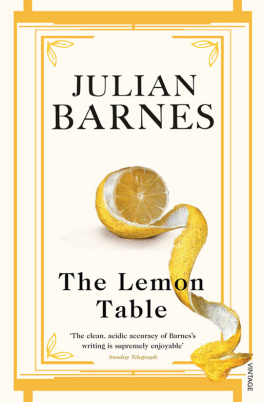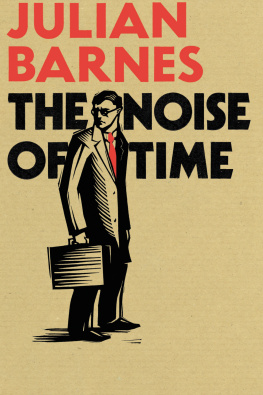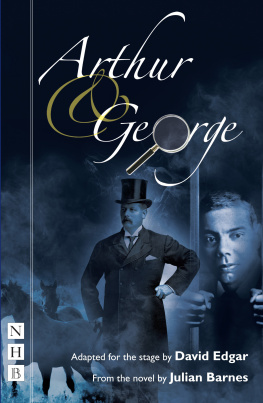Praise for Julian Barness The Lemon Table
A New York Times Notable Book
Barnes is a top-flight precisionist, [with] the steady, pleasing wit of English comic realism, in which sheer intelligence and acute observation carry the whole production, line after line, page after page. The Lemon Table , in ways both modest and grand, helps sustain a readers faith in literature as the truest form of assisted living. The New York Times Book Review These gracefully constructed stories are subtle, erudite, and wise; they elevate us because there are few such generous observers of humanity. In a word: The Lemon Table is Barnes at his profound, dexterous best. Esquire [Julian Barnes is] one of the most gifted contemporary shapers of prose, possessed of a remarkable limberness of form and voice, and an unconstrained literary imagination. The New Republic The stories in The Lemon Table are quite old-fashionedin the best sense of the word. They remind one of the deceptive simplicity of the stories of Chekhov or that prodigy of the absurd, Nikolai Gogol. With their underlying classicism, their commitment to truth and beauty, Barness stories also harken back to a pre-existential time in which hope was still, in a tragic sort of way, possible. The Boston Globe Barnes can telescope the whole world through a single lens. Each story unfolds with masterly speed, diving quickly to the heart of the matter. The Courier-Journal (Louisville) Remarkable meditations on loneliness and aging. St. Petersburg Times Julian Barnes has many interests [and] a variety of talents that enable him to manage them all. The Lemon Table leaves one in no doubt as to Barness virtuosity. The Guardian (London) [A] brave, well-crafted book. Barnes describes the realities of aging with precision and a knack for matching narrative device to psychological reality. People Were you as young as you felt, or as old as you looked? This is the conundrum at the heart of The Lemon Table , [with] assorted pensioners, catty widows, randy old army majors, and noise-sensitive concertgoers forcefully exercising their right not to go gently into that good night. Vogue
Julian Barnes
The Lemon Table
Born in Leicester, England, in 1946, Julian Barnes is the author of a previous book of stories, Cross Channel , two collections of essays, a translation of Alphonse Daudets In the Land of Pain , and nine novels. In France, he is the only writer to have won both the Prix Mdicis and the Prix Fmina, and in 2004 he became a Commandeur de lOrdre des Arts et des Lettres; in England his honors include the Somerset Maugham Award and the Geoffrey Faber Memorial Prize. He has also received the E. M. Forster Award from the American Academy and Institute of Arts and Letters. He lives in London.
www.julianbarnes.com
ALSO BY JULIAN BARNES
FICTION
METROLAND
BEFORE SHE MET ME
FLAUBERTS PARROT
STARING AT THE SUN
A HISTORY OF THE WORLD IN 10 CHAPTERS
TALKING IT OVER
THE PORCUPINE
CROSS CHANNEL
ENGLAND, ENGLAND
LOVE, ETC.
NONFICTION
LETTERS FROM LONDON, 1990-1995
SOMETHING TO DECLARE
THE PENDANT IN THE KITCHEN
TRANSLATION
IN THE LAND OF PAIN by Alphonse Daudet

to Pat
Contents
A Short History of Hairdressing
T hat first time, after they moved, his mother had come with him. Presumably to examine the barber. As if the phrase short back and sides, with a little bit off the top might mean something different in this new suburb. Hed doubted it. Everything else seemed the same: the torture chair, the surgical smells, the strop and the folded razorfolded not in safety but in threat. Most of all, the torturer-in-chief was the same, a loony with big hands who pushed your head down till your windpipe nearly snapped, who prodded your ear with a bamboo finger. General inspection, madam? he said greasily when hed finished. His mother had shaken off the effects of her magazine and stood up. Very nice, she said vaguely, leaning over him, smelling of stuff. Ill send him by himself next time. Outside, she had rubbed his cheek, looked at him with idle eyes, and murmured, You poor shorn lamb.
Now he was on his own. As he walked past the estate agents, the sports shop and the half-timbered bank, he practised saying, Short back and sides with a little bit off the top. He said it urgently, without the comma; you had to get the words just right, like a prayer. There was one and threepence in his pocket; he stuffed his handkerchief in tighter to keep the coins safe. He didnt like not being allowed to be afraid. It was simpler at the dentists: your mother always came with you, the dentist always hurt you, but afterwards he gave you a boiled sweet for being a good boy, and then back in the waiting room you pretended in front of the other patients that you were made of stern stuff. Your parents were proud of you. Been in the wars, old chap? his father would ask. Pain let you into the world of grown-up phrases. The dentist would say, Tell your father youre fit for overseas. Hell understand. So hed go home and Dad would say, Been in the wars, old chap? and hed answer, Mr. Gordon says Im fit for overseas.
He felt almost important going in, with the adult spring of the door against his hand. But the barber merely nodded, pointed with his comb to the line of high-backed chairs, and resumed his standing crouch over a white-haired geezer. Gregory sat down. His chair creaked. Already he wanted to pee. There was a bin of magazines next to him, which he didnt dare explore. He gazed at the hamster nests of hair on the floor.
When his turn came, the barber slipped a thick rubber cushion onto the seat. The gesture looked insulting: hed been in long trousers now for ten and a half months. But that was typical: you were never sure of the rules, never sure if they tortured everyone the same way, or if it was just you. Like now: the barber was trying to strangle him with the sheet, pulling it tight round his neck, then shoving a cloth down inside his collar. And what can we do for you today, young man? The tone implied that such an ignominious and deceitful woodlouse as he obviously was might have strayed into the premises for any number of different reasons.
After a pause, Gregory said, Id like a haircut, please.
Well, Id say youd come to the right place, wouldnt you? The barber tapped him on the crown with his comb; not painfully, but not lightly either.
Short-back-and-sides-with-a-little-bit-off-the-top-please.
Now were motoring, said the barber.
They would only do boys at certain times of the week. There was a notice saying No Boys on Saturday Mornings. Saturday afternoons they were closed anyway, so it might just as well read No Boys on Saturdays. Boys had to go when men didnt want to. At least, not men with jobs. He went at times when the other customers were pensioners. There were three barbers, all of middle age, in white coats, dividing their time between the young and the old. They greased up to these throat-clearing old geezers, made mysterious conversation with them, put on a show of being keen on their trade. The old geezers wore coats and scarves even in summer, and gave tips as they left. Gregory would watch the transaction out of the corner of his eye. One man giving another man money, a secret half-handshake with both pretending the exchange wasnt being made.
Boys didnt tip. Perhaps that was why barbers hated boys. They paid less and they didnt tip. They also didnt keep still. Or at least, their mothers told them to keep still, they kept still, but this didnt stop the barber bashing their heads with a palm as solid as the flat of a hatchet and muttering, Keep still . There were stories of boys whod had the tops of their ears sliced off because they hadnt kept still. Razors were called cut-throats. All barbers were loonies.
Next page









